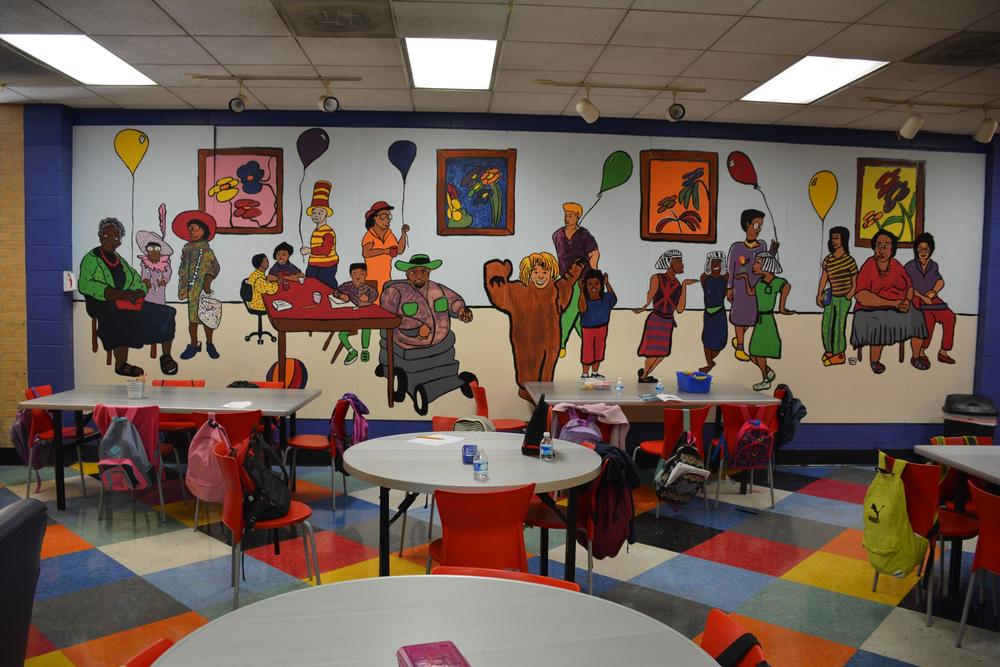
Section Branding
Header Content
Breaking The Cycle of Generational Poverty
Primary Content

The first thing you need to know about Lucille Perry is that she has a great laugh. The second thing is that she works…a lot.
“I got here at 7:00 A.M., and I’ll leave at 4:30 P.M. I have to be to my next job at 5:45 P.M., and I’ll probably get off at 10:00 P.M. tonight,” she says.
She works three jobs, seven days a week.
Perry cleans houses and babysits, and she’s also an administrative assistant at Trinity Presbyterian Church in Buckhead, where she spoke to me on her lunch break.
She says that work nets her just over $2,400 a month, before taxes. That’s above the poverty line, but Perry says she barely makes ends meet, and she’s not the only person she’s supporting.
“My mom told me, ‘If you go to work, you’re gonna have to pay bills,’” says Perry’s daughter, Ketta Miles, as she laughs. “I’m like, ‘I don’t want to do that. I’m a kid still. I guess I’ll go to school and you take care of me for another 4 years.’”
Miles has a great laugh, like her mother, but there’s one thing both Perry and her daughter hope they don’t end up sharing.
“I always tell her that I don’t want you to be like mama, have to work these three or four jobs to make a living,” Perry says.
“I don’t want to do that. I don’t want to be living check to check,” Miles says.
---
There’s a chance their hopes might come true thanks to help they’ve received from one Atlanta non-profit.
“Our overall mission is to end the cycle of generational poverty one child at a time,” says Nell Benn Executive Director of the Agape Youth and Family Center.
Agape is an outreach arm of Trinity Presbyterian Church, where Lucille Perry works.
The center’s mission is to keep kids from falling into the cycle of generational poverty by getting them to graduate from high school and attend college.
“If we can get that child into college, then we begin breaking that cycle,” Benn says.
Agape’s focus is hyper local. The center only serves children in the Bolton Road neighborhood of northwest Atlanta and only children that qualify for free and reduced lunch.
It offers after-school programs for younger kids, in-school support for high schoolers, and help with the college application process, but Benn says the biggest challenge is giving Agape’s children something intangible.
“A lot of our children don’t have hope. They do not realize that college is a possibility for them,” says Benn.
---
Ketta Miles was one of those children. “I never thought about going to college, I can tell you that now,” she says.
“My dream was — with my niece — we were playing [and] talking about working at Waffle House. Oh, God. Don’t know why in the world we wanted to work there.”
She started going to Agape in the first grade and stuck with the center through high school. Now, Miles is a junior at Spelman College on her way to a Bachelor’s degree.
“Without Agape and without my mom, I wouldn’t be in the same situation,” she says. “I would probably be…I could have easily fell back into the cycle that my family was going into.”
Miles’ path has become a common one for Agape’s children. Since 2009, 100% of the students that have stayed in the center’s programs through their senior year have graduated high school.
Though a degree does not guarantee future success, it does tend to increase a person’s earning potential, according to data from the Bureau of Labor Statistics.
---
After our conversation, Miles returns to studying with a friend. She’s still not sure what she’s going to do once she graduates, but she’s an optimist.
“The sky’s not the limit. I don’t know who made that up,” she says.
“Mom said, 'You reach beyond the stars, there’s something out there we don’t know. Once you find it, you keep going.'”
She’s got hope for a future that’s her own.
(This story also appears on Medium.)
Tags: Atlanta; Agape; poverty; generational poverty
Bottom Content
